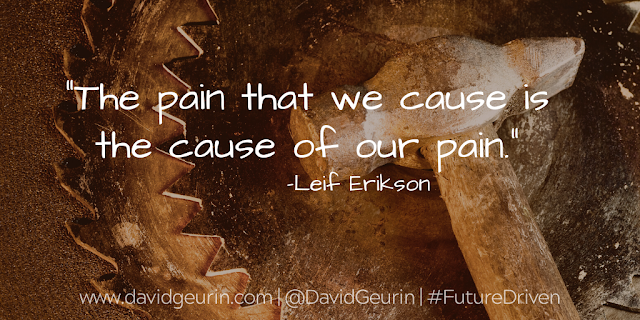How important are bus drivers? Our kids' safety is in their hands. They are the first point of contact in the morning and help set the tone for the day. Bus drivers make a difference. And so do cooks. And custodians. And everyone else who gives so much to the life of a school.
I was speaking last week at the Cypress-Fairbanks Rigor, Relevance, and Relationships Leadership conference in Houston. It was a great event, and I enjoyed making some wonderful connections with educators there.
One of the people I met shared some valuable wisdom with me. The conference provided a shuttle to and from the hotel, and my driver's name was Tammy.
She drives a school bus for the district, but she's not just a regular school bus driver. She substitutes for all the bus routes in the Cy-Fair district (one of the largest in Texas) wherever she's needed.
I can't imagine how difficult that must be to drive a different group of kids every day, on a different school bus, in city traffic, with your back turned to them. That takes a special skill set!
Tammy is amazing! I was inspired by her commitment and her kindness. I asked her how she handles working with so many different kids while navigating unfamiliar routes.
I'm paraphrasing what Tammy said...and then adding a few of my thoughts too. She shared great advice and encouragement!
1. "They can tell I enjoy them and love them. And that makes all the difference."
When kids know you care about them and accept them, you'll bring out the best in them. The quickest way to change another person's behavior is to change your behavior towards them. Every kid wants to feel like they are easy to love.
2. "When I ask them to do something, I address them as sir or m'am. And when they follow through, I say thank you."
Kids are going to make mistakes. But if you make it a point to enjoy being with them, and treat them with great respect and care, there is almost no mistake you can't correct. They'll be far more open to your feedback when they feel that you have the highest respect for them.
3. "When those middle school students realize they can't get under my skin, I have them right where I want them."
The kids are going to test you and see how you respond. If it's with anger or frustration, the situation is likely to escalate. If you are firm, polite, and also calm and caring, you'll get a much better result. Let them know you're in their corner even when you're correcting them.
4. "I keep doing this because they need me."
Tammy explained she had thought about retiring, but I could tell she also felt great satisfaction and purpose in what she's doing. She sees purpose and contribution in what she does. She's making things better with each interaction she has.
5. "I can tell you put your heart and soul into what you do."
She said that to me. I was so honored and humbled. She gave me a big hug when she dropped me off at the airport. And I'm not even that much of a hugger. She encouraged me and affirmed me and added value to me.
Who makes the difference in your school?
Every person who works in a school makes a difference. Every person contributes to the culture of the school.
What if everyone in your school gave as generously as Tammy to love and support the kids and the adults in the school? What if we all showed a little more care and appreciation for every person in every interaction? That's how you build a strong school culture.
Who is someone who inspires you? How are you giving generously to others? Leave a comment below or respond on Facebook or Twitter. I would love to hear from you.

















